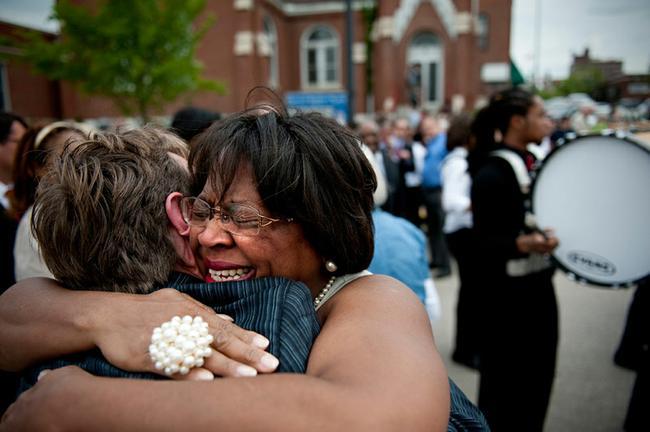The voices of a gospel choir rang throughout Second Missionary Baptist Church on Saturday, as people of all ages, races and backgrounds clapped and sang along in a celebration of lynching victim James T. Scott’s life.
Scott, a World War I veteran and janitor at MU, was accused of sexually assaulting 14-year-old Regina Almstedt and subsequently hanged from Stewart Bridge by a mob April 30, 1923. The service sought to recognize those who tried to prevent the lynching, as well as to give closure to the injustice by giving Scott a proper memorial service and a headstone for his unmarked grave.
MU history professor Patrick Huber and author of “The Lynching of James T. Scott: The Underside of a College Town” began the service with an address on the Scott’s life. Huber said Scott’s life should not be defined by its brutal end.
“We should not think of James T. Scott as a stranger,” he said. “In him and in his story we can recognize pieces of ourselves and our common humanity.”
Huber gave a full history of Scott’s life, giving depth to the story and putting a level of humanity behind the much-talked-about figure in Columbia’s history.
“It is this story, the story of his life, that compels us to gather here today, 88 years after his brutal and untimely death,” he said. “He has inspired us to come together to help in a small but significant act to atone for past injustices done in this community and to recognize the simple humanity and honorable life of one of its departed citizens.”
The service also honored Charles Nutter, a journalist at MU, who testified against the leaders of the mob that killed Scott. Brian Brooks, associate dean of the MU School of Journalism, spoke about Nutter’s actions.
“In 1923, just a few blocks from here, not many people had the courage to stand up and do the right thing,” Brooks said. “But Charles Nutter did just that. He saw a grievous wrong, and he tried to help it.”
Benjamin Almstedt, the father of the 14-year-old girl Scott was accused of raping, was also honored for his actions on the night of the lynching. Almstedt followed the angry mob to the bridge where he begged them not to hang Scott without a fair trial, as he said, “In the name of law, order and the American flag.”
His grandson, who spoke briefly about his grandfather, accepted the award on his behalf.
Scott maintained he was not guilty until the very end, and his last words as he was pushed off the bridge were, “I am innocent.”
The service ended with a procession down Broadway to Columbia Cemetery, where a military funeral was performed and flowers were placed on a new headstone for Scott.
Bryan Like, president of MU’s chapter of the NAACP had a hand in planning the ceremony and said seeing such a big turnout is an encouraging sign for the Columbia community.
“It reflects a new era, a new time in which we try to amend our past, and learn from it, but not forget it,” he said.








